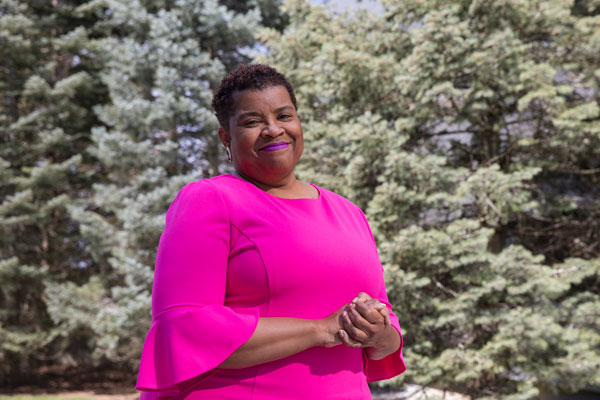Bryant named diversity director at Decker College of Nursing and Health Sciences

Sharon Bryant is the first person in her family to graduate from college and the first to earn a graduate degree. She said her drive to attain a college education came from watching her mother struggle to earn two associate degrees while raising children.
This instilled in Bryant — who holds master’s, master of philosophy and doctoral degrees in medical sociology from Yale University — a desire to help financially disadvantaged students and those from historically underrepresented minority groups achieve their dream of a college education.
As director of Binghamton University’s Collegiate Science and Technology Entry Program (CSTEP), which prepares students from underrepresented groups for successful careers in medicine, law, education, science, technology and more, Bryant works to achieve that goal.
“The work I do with CSTEP undergirds my passion to help these students increase their opportunities to pursue professional careers,” Bryant said.
In March, Bryant was also named director of diversity, equity and inclusion (DEI) at Decker College of Nursing and Health Sciences, where the medical sociologist is an associate professor in the Master of Public Health program.
In this new role, Bryant leads Decker’s efforts to advance diversity, equity and inclusion throughout the college’s culture, environment, programs, policies and personnel. Working with faculty, staff, students and other stakeholders across campus, Bryant’s goal is to foster a supportive community that respects differences of all kinds and nurtures excellence.
“Sharon Bryant brings an extraordinary vision, passion and expertise to the challenge of building and maintaining a truly diverse and inclusive environment within Decker College,” said Dean Mario Ortiz. “As the college’s first director of diversity, equity and inclusion, I believe she will move us forward to become a school that values the differences among our students, staff and faculty.”
Bryant said one of the most important aspects of her new role is something she’s been doing for years as CSTEP director — advising and assisting undergraduate and graduate students when they have diversity-related concerns or problems with faculty, programs or University administration.
“I have assisted students with a variety of issues,” she said. “I help them overcome differences and support them if they have grievances.”
Among Bryant’s plans as director of DEI are developing a more holistic admissions process through which an applicant’s unique experiences are assessed equally alongside traditional measures of academic achievement such as grades and test scores. She believes this will result in a more diverse student body.
“I would like our student body to be more reflective of the make-up of our state,” she said.
Her other plans include conducting a climate survey with Decker’s faculty, staff and students to determine what their attitudes and opinions are regarding DEI at the college: What is Decker doing well? What needs improvement? She also intends to create workshops on understanding and overcoming issues identified in the survey.
“In my role as director of diversity, equity and inclusion, I will work with Decker faculty, staff and students to support the University’s third Strategic Priority, creating an inclusive campus,” Bryant said. “We want to create our own definition of belonging and seek to develop approaches to increase a sense of belonging. We plan to identify gaps in knowledge related to diversity, equity and inclusion and provide training in those areas.
“I hope Decker’s faculty and staff can work together and come to a place where we see some of ourselves in people who don’t have our own experiences, who don’t look like us, because then we are bridging our racial, cultural or class differences,” she added. “That’s when we become more tolerant.”

